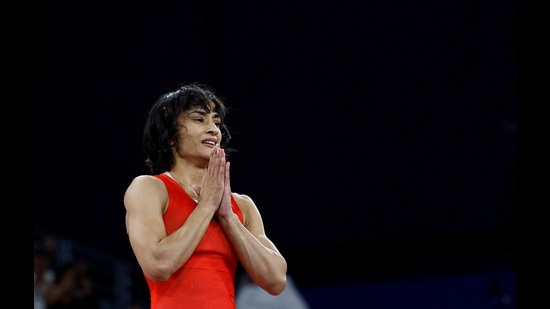The night before, she has done the unthinkable — beaten a wrestler who has been unbeaten since the beginning of her international career. The night before, she is India’s great medal hope, a silver at the very least but gold is within kissing distance. The night before, she is the woman who took on the system and won.

It all comes crashing down on the morning after. Vinesh Phogat, who should have been looking at the biggest fight of her career, is out. In an Olympics, where 5,000ths of a second has made the difference between gold and silver in the men’s 100 m, that 100 gm over the 50 kg limit is critical.
On the morning of the preliminary round, where she defeated Japanese Yui Susaki, who has been undefeated in 95 international matches since her career kicked off as a junior in 2010, Phogat weighed in at 50 kg, the category she chose from her earlier 53 kg. But the next day, she was up 100 gm. Under the rules, athletes who fail the weight criterion are eliminated from the competition.
Phogat was not only disqualified from the final, but she had also lost the guaranteed silver won by defeating Susaki.
This was her redemption tour, as much as it was for Simone Biles who was returning after a break to focus on her mental health and as much as it was for Manu Bhaker, whose malfunctioning pistol in Tokyo became a symbol for all that was wrong with Indian sport.
Phogat’s struggles for well over a year have been of a different kind and are without comparison. Like so many stories about workplace sexual harassment, the rot at the Wrestling Federation of India was an open secret. The allegations against its president, Brij Bhushan Sharan Singh, a six-time member of Parliament from the Bharatiya Janata Party (BJP), had been swirling for a while. Then, Phogat along with India’s leading wrestlers, including Bajrang Punia and Sakshi Malik, decided to speak up.
She was doing it not just for herself but for all the other girls — girls who break down impossible barriers and family opposition just for the privilege of playing. Girls who look up to medal-winners like her and believe they too can win. Girls who are brought up to never complain and who dare not speak of injustice, whether by corrupt sports administrators or their own school teachers or sometimes even their own families.
In January 2023, in an unprecedented protest, India’s most decorated athletes took to the streets to demand justice from their own federation boss. The government quickly assured them an inquiry would be held and justice served.
It was hogwash. By April, when not even a police complaint had been filed, the wrestlers were back. Then on the day the new Parliament building was to be inaugurated, the wrestlers who had planned a peaceful march were detained by the police, dragged into buses and hauled away. It remains one of the most disgraceful visuals in public life, proof of how little India’s heroes matter and of how far the establishment will go to protect its own.
But in the end, when the elections were declared, even the BJP could not give Singh a ticket to contest. So, it did the next best thing. It gave it to his son.
By August, after a chargesheet was finally filed against Singh, Vinesh had a new problem — her knee. But by December she was back and raring to make up for lost time. An Olympic medal, she told journalists, was her dream. There’s no time to lose. She has to shave off three kilos. She has to get back on the mat. She needs to make sure her knee won’t let her down. And then finally she’s in Paris and the nation goes to bed with a billion prayers. Until the next morning.
We speak of fair play in sport. But sport is also cruel with years of practice gone in seconds. Months of disciplined eating with nothing to show for it. The scale on which Phogat stood does not know of her past struggles. It cannot measure her grit. It has no way of sizing up how many dreams she has fired just by fighting. It only knows she is 100 gm over what the rules allow.
And, yet, in a state like Haryana that has produced a disproportionate number of champions and opened the doors for countless girls, the name of Vinesh Phogat is assured a place, medal or not. She has remained unbroken, whether it’s an ACL tear in Rio or early defeat in the Tokyo quarterfinals, to now this disqualification.
Vinesh Phogat returns to India as a winner. For demanding accountability from a corrupt system. For showing girls that remaining silent is never an option, and that speaking up comes at a price, but it’s a price worth paying.
Namita Bhandare writes on gender.The views expressed are personal


